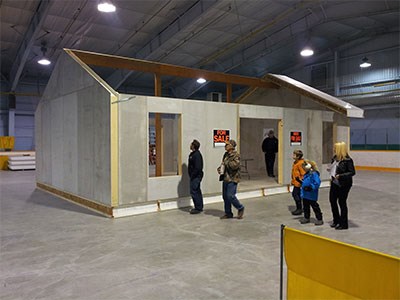An Aboriginal homebuilder is aiming for a late fall groundbreaking to build a composite home manufacturing plant to serve First Nation communities in northwestern Ontario.
AlterNative Homes of Edmonton is making plans to move into a Dryden municipal industrial park and fill 20 positions by next spring.
“We've been trying to get this off the ground for three and a half years,” said company CEO Bernie Bird, a northeastern Ontario Moose Cree, who's built a professional career as a petroleum engineer in Alberta.
The $2-million Dryden plant will be his first foray into the homebuilding business with the Edmonton-based startup company.
Joining him on this venture are partners Leon Tirums, who spent 20 years in the Florida housing scene and Bird's brother, Philip, who brings 35 years of experience in contracting.
Dryden would be the first of three regional plants to serve Aboriginal clientele in the mid-Canada, East and West Coast markets.
The company's cornerstone product is centred around producing a magnesium oxide board which is mould and mildewresistant and fire retardant.
This checks off many problems that plague residents on First Nation reserves with conventional stick-built homes.
“This product is a natural board, no toxins or off-gases and it's waterproof and doesn't disintegrate,” said Bird. “It's a good product all around and easy to put together.” Nicole Gale, manager at the Dryden Development Corporation (DDC), likes the versatility of the product.
“They have the capability to build any style of home. They can do sound barriers along major highways, docking, port-a-potties; there are all sorts of applications for the product.”
The plant will feature a line of pultrusion machines, a process used in manufacturing composite materials, to make wall, roof and floor panels. A warehouse will store finished product awaiting delivery.
The plant would be capable of producing five houses a day. In July, the company was in negotiations with the DDC and the City of Dryden to purchase land in the Norwill Industrial Park. The DDC is assisting AlterNative with a government grant application.
Bird grew up in northeastern Ontario before moving West where he became a petroleum engineer in the Alberta oil industry. He survived residential school and lived in a Cochrane foster home until he was adopted and moved to the Barrie area. Summers spent working railway jobs in Western Canada evolved into a permanent move to Alberta in 1978 to work on oil rigs.
This opportunity was spurred by the chronic issues of inadequate housing on reserves across Canada. “Working in the oil industry, we're on reserves in northern Alberta, British Columbia and Saskatchewan and you ask yourself, how can these people live like this? And why isn't the government doing something about this? This is why we want to be in the market, to make a better living environment for people.”
Last year, the company displayed their building system at the Assembly of First Nations annual conference in Toronto.
“It was amazing the people we met who were interested in our product.”
Dryden residents got their first peak when the company erected a 22-by-32 foot demonstration unit for a local home show this past spring.
Bird said it's has drawn plenty of interest including from the Eagle Lake First Nation near Dryden.
“I feel good about it and it's something that I want to succeed because of the difference it will make.” The beauty of this system is the quick turnaround time once a customer order is taken.
Built for roughly $85-per-square foot, Bird said the drawings for a basic 1,200-squarefoot home can done within days and the panels can be made within a week or two and shipped to a location.
The building panels can be screwed together within two days and ready to move in within two weeks once plumbing and electrical work is installed.
To create Aboriginal employment, Bird would like to establish a factory-trained assembly team. He hopes to construct a mock subdivision of a half-dozen variations of homes. But rather than put out a catalogue, he wants to build more customized units according to an individual community's specifications.
“We'd like to build what the reserves have in mind. We'd like to have what they would like.”




